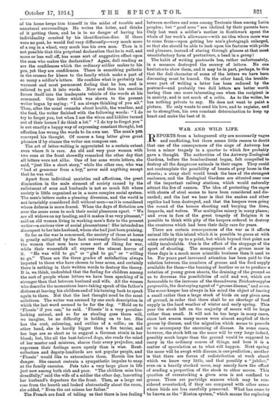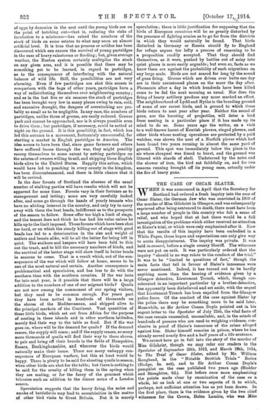WAR AND WILD LIFE.
REPORTS from a beleaguered city are necessarily vague and conflicting, but there seems little reason to doubt that one of the consequences of the siege of Antwerp ha, been a minor tragedy in a quarter to which few probably gave a thought. The authorities of the Antwerp Zoological Gardens, before the bombardment began, felt compelled to destroy all the dangerous animals in their cages. They could not contemplate the possibility of beasts of prey loose in the streets ; a stray shell would break the bars of the strongest enclosure, and the Zoological Gardens are situated near one of the important railway stations, which would naturally attract the fire of cannon. The idea of protecting the cages with sheets of steel seems to have been considered and dis- carded; and the last we hear is that the snakes and other reptiles had been destroyed, and that the keepers were going the round of the houses shooting and burying the lions, leopards, and wolves. War multiplies misery in many places; and even in face of the great tragedy of Belgium it is possible to think with pity of the keepers ordered to destroy the creatures which had been their daily care for years.
There are certain consequences of the war as it affects animal life in this island which it is possible to guess at with some certainty up to a point, but which beyond that point are oddly incalculable. One is the effect of the stoppage of the sport of shooting. The management of a grouse moor in these days is a much more scientific business than it used to be. For years past increased attention has been paid to the relation between the numbers of grouse and the food supply available for them—the burning of heather so as to produce a rotation of young green shoots, the draining of the ground so as to decrease the possibilities of cold and wet, which are favourable to the increase of the threadworm Trichostrongyl as pergracilis, the destroying agent of " grouse disease," and so on. The moor-keeper has always in his mind the object of leaving a small rather than a large stock of birds on any given area of ground, in order that there shall be no shortage of food supply in the hard weather of winter and early spring. This year the stock left on the majority of moors will be large rather than small. It will not be too large in many cases, since last season many moors were almost emptied of their grouse by disease, and the migration which seems to precede or to accompany the oncoming of disease. In some cases, however, the stock left on the moor will be very large indeed, possibly much larger than the ground would be supposed to carry in the ordinary course of things, and here it is a matter of speculation as to what will happen. Next spring the moor will be swept with disease, is one prediction ; another is that there are forces of redistribution at work about which we know very little, and that possibly a "jubilee," even on a heavily stocked moor, may merely have the effect of sending a proportion of the stock to other moors. This question of overstocking a given area is not confined to grouse. There are partridge manors which may be con- sidered overstocked, if they are compared with other areas where birds are less carefully preserved. What has come to be known as the "Euston system," which means the replacing of eggs by dummies in the nest until the young birds are on the point of hatching out—that is, reducing the risks of incubation to a minimum—has raised the numbers of the stock of birds on some estates to what may seem an almost artificial level. It is true that no process or artifice has been discovered which can ensure the survival of young partridges in the case of heavy rainstorms or flooding ; but, given average weather, the Euston system certainly multiplies the stock on any given area, and it is possible that there may be something yet to be learned, in regard to partridges, as to the consequences of interfering with the natural balance of wild life. Still, the possibilities are not very alarming. Even if few partridges are shot this season in comparison with the bags of other years, partridges have a way of redistributing themselves over neighbouring country ; and as in the last five or six seasons the stock of partridges has been brought very low in many places owing to rain, cold, and excessive drought, the dangers of overstocking are pro- bably so small as to be negligible. In any case, the numbers of partridges, unlike those of grouse, are easily reduced. Grouse pack and cannot be approached, nor is it always possible even to drive them ; but partridges, if necessary, could be netted at night on the ground. It is this possibility, in fact, which has led this autumn to a movement, fortunately unsuccessful, for starting a market in English partridges to America. The idea seems to have been that, since game farmers and others have suffered losses through the war, they might possibly recoup themselves to some extent by netting partridges on the estates of owners willing to sell, and shipping these English birds alive to the United States. Happily this action, which would have led to poaching in every county in the kingdom, has been discountenanced, and there is little chance that it will be revived.
In the deer forests of Scotland the absence of the usual number of stalking parties will have results which will not be apparent for some time. Forests vary in their fortunes as to management and letting ; some are very carefully looked after, and some go through the hands of yearly tenants who have no abiding interest in the country, and only try to carry away with them the best heads, indifferent as to the prospects of the season to follow. Some offer too high a limit of stags, and the tenant does not think he has had his value unless he kills up to the limit imposed. Those forests which have been shot too hard, or on which the steady killing out of stags with good beads has led to a deterioration in the size and weight of antlers and beasts alike, will be all the better for being left in quiet. The stalkers and keepers will have been told to thin out the trash, and to kill the necessary numbers of hinds, and the survival of the better stags will show itself in better heads in seasons to come. That is a result which, out of the con- sequences of the war which will follow at home, seems to be one of the most natural and certain. Another consequence is problematical and speculative, and has less to do with the northern than with the southern counties. If the war lasts far into next year, is it possible that there will be a large addition to the numbers of one of our migrant birds ? Quails are not now among the commonest of our spring visitors, but they used to be common enough. For years past they have been netted in hundreds of thousands on the shores of the Mediterranean, and shipped alive to the principal markets of the Continent. Vast quantities of these little birds, which set out from Africa for the purpose of nesting in these islands and in other northern latitudes, merely find their way to the table as food. But if the war goes on, where will be the demand for quails ? If the demand ceases, the supply will cease ; and if the supply ceases, so many more thousands of quails will find their way to these shores, to pair and bring off their broods in the fields of Hampshire, Sussex, Buckinghamshire, and wherever the birds would naturally make their home. There are many unhappy con- sequences of European warfare, but this at least would be happy. There is plenty to be said for shooting quails in season, when other birds are shot for the table; but there is nothing to be said for the cruelty of killing them in the spring when they are mating, or for the fancy of the gourmet which tolerates such an addition to the dinner menu of a London season.
Speculation suggests that the heavy firing, the noise and smoke of battlefields may lead to eccentricities in the matter of other bird visits to Great Britain. But it is merely
speculation ; there is little justification for supposing that the birds of European countries will be so greatly disturbed by the presence of fighting armies as to go far from the districts in which they would naturally be found. That birds disturbed in Germany or Russia should fly to England for refuge argues too lofty a process of reasoning to be a proposition readily accepted. That they should find themselves, as it were, pushed by battles out of noisy into quiet places is more easily arguable ; but even so, facts as we know them are against the probability of such migrations on any large scale. Birds are not scared for long by the sound of guns firing. Grouse which are driven over butts one day are in their accustomed places on the moor the day after. Pheasants after a day in which hundreds have been killed come to be fed the next morning as usual. Nor does the firing of heavy artillery produce any more marked an effect. The neighbourhood of Lydd and Hythe is the breeding ground of some of our rarest birds, and is ground to which these birds return to nest year after year. Neither the sound of guns, nor the bursting of projectiles, will deter a bird from nesting in a particular place if it has made up its mind to do so. Some years ago the writer, on a visit to a well-known haunt of Kentish plovers, ringed plovers, and other birds whose nesting operations are protected by a paid watcher, was shown the nest of a Norfolk plover which had been found two years running in almost the same yard of ground. This spot was immediately below the place in the air where shrapnel was timed to burst, and the ground was littered with shards of shell. Undeterred by the noise and the shower of iron, the bird sat faithfully on, and for two seasons running brought of its young ones, actually under the fire of heavy guns.



































 Previous page
Previous page